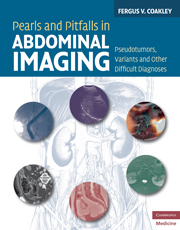Book contents
- Frontmatter
- Contents
- Preface
- Acknowledgements
- Section 1 Diaphragm and adjacent structures
- Section 2 Liver
- Section 3 Biliary system
- Section 4 Spleen
- Section 5 Pancreas
- Section 6 Adrenal glands
- Section 7 Kidneys
- Case 40 Radiation nephropathy
- Case 41 Lithium nephropathy
- Case 42 Pseudoenhancement of small renal cysts
- Case 43 Pseudotumor due to focal masslike parenchyma
- Case 44 Pseudotumor due to anisotropism
- Case 45 Echogenic renal cell carcinoma mimicking angiomyolipoma
- Case 46 Pseudohydronephrosis
- Case 47 Pseudocalculi due to excreted gadolinium
- Case 48 Subtle complete ureteral duplication
- Section 8 Retroperitoneum
- Section 9 Gastrointestinal tract
- Section 10 Peritoneal cavity
- Section 11 Ovaries
- Section 12 Uterus and vagina
- Section 13 Bladder
- Section 14 Pelvic soft tissues
- Section 15 Groin
- Section 16 Bone
- Index
- References
Case 47 - Pseudocalculi due to excreted gadolinium
from Section 7 - Kidneys
Published online by Cambridge University Press: 05 November 2011
- Frontmatter
- Contents
- Preface
- Acknowledgements
- Section 1 Diaphragm and adjacent structures
- Section 2 Liver
- Section 3 Biliary system
- Section 4 Spleen
- Section 5 Pancreas
- Section 6 Adrenal glands
- Section 7 Kidneys
- Case 40 Radiation nephropathy
- Case 41 Lithium nephropathy
- Case 42 Pseudoenhancement of small renal cysts
- Case 43 Pseudotumor due to focal masslike parenchyma
- Case 44 Pseudotumor due to anisotropism
- Case 45 Echogenic renal cell carcinoma mimicking angiomyolipoma
- Case 46 Pseudohydronephrosis
- Case 47 Pseudocalculi due to excreted gadolinium
- Case 48 Subtle complete ureteral duplication
- Section 8 Retroperitoneum
- Section 9 Gastrointestinal tract
- Section 10 Peritoneal cavity
- Section 11 Ovaries
- Section 12 Uterus and vagina
- Section 13 Bladder
- Section 14 Pelvic soft tissues
- Section 15 Groin
- Section 16 Bone
- Index
- References
Summary
Imaging description
Gadolinium is a rare-earth metal used as an MRI contrast agent because of its paramagnetic properties. Gadolinium has a high atomic number (64, compared to 53 for iodine) and absorbs x-rays, and so functionally can act as a radiographic contrast agent. Before the recognition of nephrogenic systemic fibrosis as a complication of gadolinium administration in patients with renal failure, gadolinium was advocated as an angiographic contrast agent for such patients [1,2]. Like iodinated contrast, gadolinium is excreted by the kidneys. Concentrated excreted gadolinium is radiodense within the collecting system at CT [3, 4], and this radiodensity can mimic renal calculi when non-enhanced CT is performed within the first few hours after a gadolinium-enhanced MRI study (Figure 47.1) [4, 5]. The phenomenon has not been extensively studied, but limited data suggest the dense appearance of excreted gadolinium at CT in the collecting systems is variable from patient to patient, and cannot be reliably predicted from the time interval since gadolinium administration, patient weight, or simple indices of renal function [4].
Importance
Misdiagnosis of excreted gadolinium as renal calculi can result in unnecessary additional investigations, such as abdominal radiography or intravenous pyelography [5].
Typical clinical scenario
Pseudocalculi due to excreted gadolinium can be seen in any patient who undergoes non-enhanced abdominal CT after a gadolinium-enhanced MRI.
Information
- Type
- Chapter
- Information
- Pearls and Pitfalls in Abdominal ImagingPseudotumors, Variants and Other Difficult Diagnoses, pp. 158 - 159Publisher: Cambridge University PressPrint publication year: 2010
